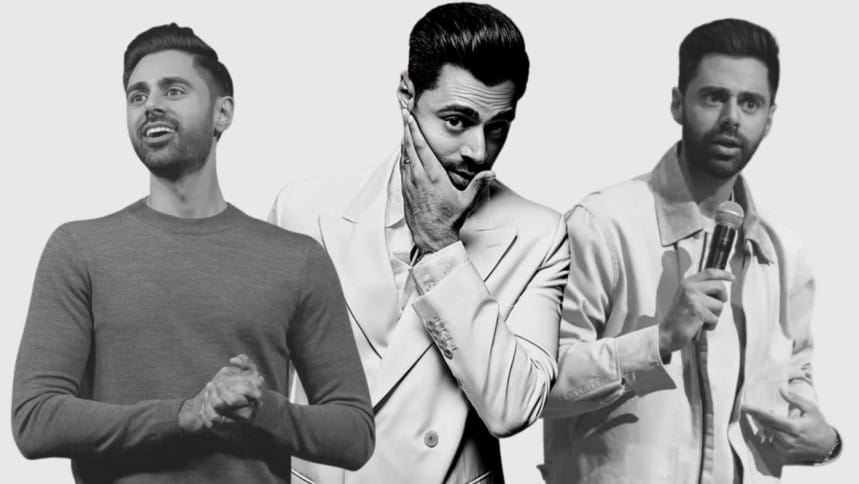‘The King’s Jester’: The prodigal son returns

Hasan Minhaj recently returned with his second stand-up comedy special, "The King's Jester". The roughly one-hour performance by the star of "Patriot Act with Hasan Minhaj"—the show that earned him an Emmy and a Peabody Award—took place in the historic Brooklyn Academy of Music.
While Minhaj's first special "Homecoming King" looked back at his childhood and climb to prominence, "The King's Jester" expanded into a meditation on Minhaj's journey to popularity, parenthood, and the consequences of ego, politics, and social media.
Minhaj, a talented raconteur, utilises this particular special to create a story that links his growing success to his failings as a spouse and father, which he is brutally honest about. If "Homecoming King" exposed America's inherent racism, "The King's Jester" exposes Minhaj's personal quest for social standing.
Following an account of his own ambivalence toward fatherhood and his struggles with his wife to conceive a child, Minhaj dives deep into his past to reveal how humour has acted as both a blessing and a burden for him.
While this alone is wonderful material, Minhaj truly finds his voice when discussing why he sometimes stirs up controversy.
Between the release of his first big stand-up special, "Homecoming King", in 2017 and the latest Netflix special, "The King's Jester", Minhaj had a very busy five years. The former Daily Show correspondent blasted Donald Trump at the White House Correspondents' Dinner while he was absent, launched and ended his weekly Netflix series "Patriot Act", and came under fire from the Saudis for his unrelenting criticism of Mohammed bin Salman, the crown prince.
Because Minhaj had allegedly violated a Middle Eastern anti-cybercrime law by criticising the killing of journalist Jamal Khashoggi, Netflix removed that particular episode of "Patriot Act" from its Saudi Arabian platform.
At the time, Minhaj responded by saying, "Of all the Netflix originals, the only show that Saudi Arabia thinks violates Muslim values is the one hosted by a Muslim" in a follow-up episode of the show.
As admirable as such sentiments may be, Minhaj is aware of his own egotistical reasons for seeking popularity. Due to the Saudi Arabia scandal, he recalled attending The Time 100 gala as an honouree and then criticising Jared Kushner on stage, for his relationship with the country's crown prince.
Later, when his wife wisely noted that he had become hooked on the attention and approval he receives from social media, he gets a taste of his own medicine. The dichotomy between trying to do good and getting sucked into the hype, or as Minhaj calls it, "cocaine clout," is masterfully exposed by Minhaj.
He also discusses free speech in comedy, a bitterly debated subject in light of the fallout from comedian Aries Spears' remarks regarding Lizzo's weight and Dave Chappelle's conflict with the queer and trans communities in his most recent stand-up specials.
The boundary is clearly defined for Minhaj, who says, "I'm only willing to take the joke as far as I possibly can until it hurts my family."
Hasan's storytelling is fascinating to watch, since he can captivate the audience with his oration and support his claims using a screen that is shown behind him. His confrontation with an undercover government agent after the 9/11 attacks was one of the show's standout moments.
In what begins as a very funny account of his horrible high-school experience, Minhaj goes on to reveal how undercover officers posed as members of his neighbourhood mosques in order to apprehend terrorists.
My favourite anecdote was a defamation lawsuit that his show "Patriot Act" was subjected to after one of its episodes criticised hedge funds and private equity firms for acquiring and destroying local newsrooms in order to make a profit.
In addition to nailing every legal joke, he also discussed difficult ideas like defamation, torts, and the law of humour without losing the audience's attention.
Minhaj skilfully balanced sincerity and satire in "The King's Jester". Through his humorous stories, he guided the audience through genuine yet difficult subjects. Although Minhaj was in perfect control, at times it felt like being on a rollercoaster. I would be giggling as I climbed up one moment, and then the fall would happen. There would be a hush in the audience.
Infertility, evil political figures, threats to his family, and hate crimes against him as a child were the subjects of his stories, which were set against a jaw-dropping visual experience. However, his expertly woven humour throughout the serious moments keeps the audience laughing.

 For all latest news, follow The Daily Star's Google News channel.
For all latest news, follow The Daily Star's Google News channel. 







Comments